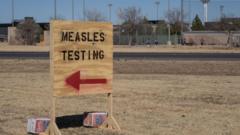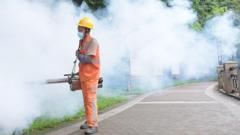As measles cases continue to surge in western Texas, health officials report the death of a second unvaccinated child from the virus. This outbreak, linked to a wider epidemiological trend amid rising anti-vaccine sentiment, raises alarms about public health and vaccination outreach in affected communities.
Measles Outbreak Claims Second Victim in Western Texas

Measles Outbreak Claims Second Victim in Western Texas
A deadly measles outbreak in western Texas has resulted in the tragic death of a second child, intensifying concerns over vaccination rates in the region.
A second child has tragically succumbed to measles in western Texas, where an outbreak of the highly contagious virus has escalated in recent months. The school-aged girl, who was unvaccinated and had no pre-existing health issues, died in a hospital due to complications related to measles, confirmed Aaron Davis, vice president of UMC Health System.
Measles cases have skyrocketed across the region, with Texas reporting over 480 incidents this year alone, marking an increase from 420 earlier in the week. Health officials indicate that this child might be one of three measles-related fatalities, with the outbreak spreading to neighboring states. "This tragic event highlights the critical importance of vaccination," Davis stated, noting that measles poses severe risks mainly to unvaccinated individuals.
The victim, an eight-year-old girl, suffered from "measles pulmonary failure" and passed away early Thursday morning. In February, a six-year-old from the local Mennonite community became the first child to die from measles in the U.S. in a decade. Additionally, an unvaccinated adult in New Mexico also died from complications related to the virus, although his cause of death remains under investigation.
Overall, the United States has reported more than 600 measles cases this year, many of which are closely tied to the outbreak originating in western Texas. Cases have also surfaced in New Mexico, Oklahoma, and Kansas. Public health experts attribute the majority of these infections to individuals who are unvaccinated.
Measles manifests with symptoms like fever, red rash, and cough and can lead to complications such as pneumonia and brain swelling. The disease was declared eliminated in the U.S. in 2000, but rising anti-vaccine sentiments have led to annual outbreaks since then. Two doses of the measles vaccine are 97% effective in preventing the disease and lessening the severity of infections.
The outbreak is believed to have begun in a religious community that largely refuses vaccinations. Despite efforts to boost vaccination rates in the area, local health officials report limited success. Meanwhile, Health Secretary Robert F. Kennedy Jr.'s response to the outbreak has garnered criticism. Initially, he described the rising cases as "not unusual," and while he has since expressed concern following the death of the first child, he has refrained from explicitly recommending vaccinations.
Instead, Kennedy has suggested that parents consult their physicians regarding the vaccine, which some public health experts deem inadequate. He has also promoted Vitamin A as a measles treatment, a suggestion contrary to medical advice that limits its use to specific instances under healthcare supervision. Concerns have also arisen in Lubbock, where Covenant's Children's Hospital has treated children for Vitamin A toxicity after they were admitted for measles-related complications.




















